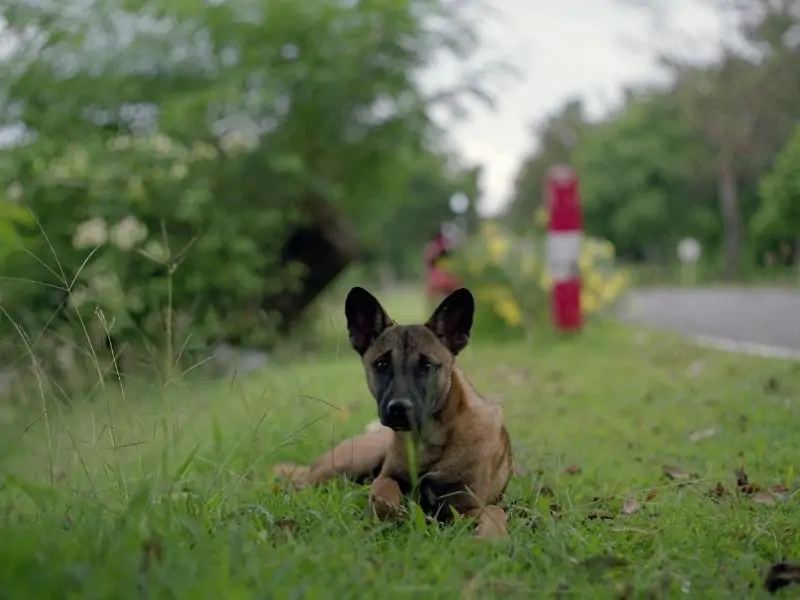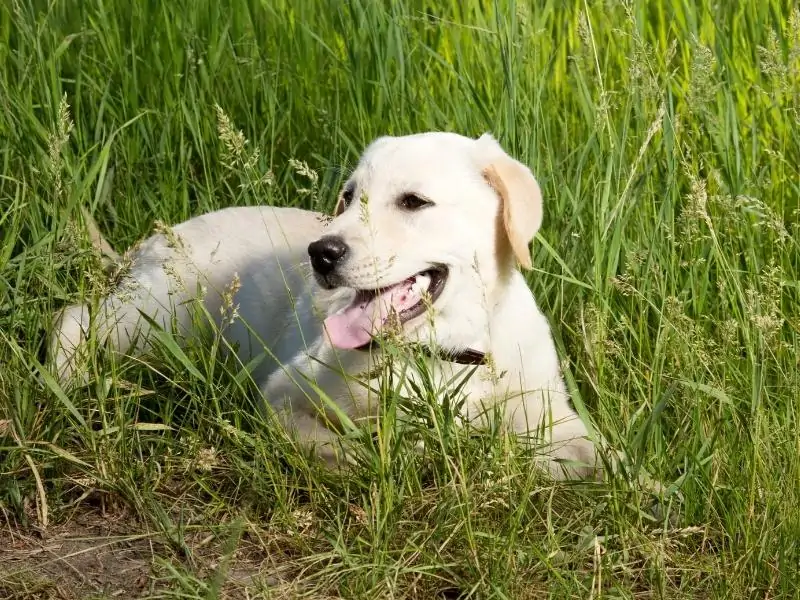Have you ever wondered why your dog loves to roll in the grass? While rolling in the grass may seem like a random doggy behavior, your pooch likely has a good reason for it. Keeping that in mind you must wonder what does it mean when my dog rolls in the grass?
Dogs roll in the grass for several reasons and most of them are related to scent. More often than not, dogs roll in the grass to cover up their own smell. Your dog may also roll in the grass to relieve a persistent itch, get rid of debris on its back, loosen up dirt on its fur, or self-groom.
If your dog has a habit of coming back from the park or the backyard covered in grass and stinking like a skunk, you’re in the right place! Read on to learn why dogs roll in the grass and how to stop this behavior.
5 Reasons Why Dogs Roll in Grass

You’ve probably seen your dog roll in the grass many times. If your pooch is rolling in every patch of grass they can find, you’ve certainly wondered what makes the grass so irresistible to your dog.
As it turns out, there are several reasons why dogs love to roll in the grass. Let’s dive in!
1. Masking Their Scent
An ancestral instinct to cover their scent is the most likely reason why dogs roll in the grass. Although domestic dogs rely on their owners to provide regular meals, their wild ancestors had to hunt and kill prey to eat.
If a deer smelled the scent of a wild dog or a wolf nearby, it would instantly run for cover and safety. For this reason, wolves learned to roll in the grass or deer dung to mask their smell and get closer to their prey (source).
For dogs, rolling in the grass may be an instinctual behavior passed on through generations and dating back to their wild ancestors.
2. It Feels Good
Rolling in the grass may not be your cup of tea, but your dog may roll in the grass simply because it feels good! If your pooch seems happy and relaxed as they are rolling in the backyard, chances are they are enjoying every second of it.
3. Covering Up a Scent
Dogs possess up to 300 million olfactory receptors in their noses while humans have a measly six million! In fact, the part of a canine brain that is used for analyzing smells is 40 times bigger than ours (source).
Having said that, it comes as no surprise that dogs aren’t fond of some scents, we humans find charming. A dog may try to cover up its own scent by rolling and taking the odor of the grass.
This type of behavior is often seen in dogs who were recently bathed. Many pooches roll in the grass or dirt immediately after a bath to cover up the scent of the shampoo.
4. Communication
With such a powerful sense of smell, it’s no surprise that dogs communicate through scent. All dogs, but males especially, will leave urine markings to signal other dogs that they were there.
Besides urine markings, rolling in the grass is another great way for a dog to leave its scent. While one dog may leave a urine marking, another may roll in that spot to pick up that scent and add its own to the mix.
5. Allergies or Skin Irritations
Soothing an itch caused by allergies or skin irritations is another possible reason for rolling in the grass. If this is the case, you’ll want to schedule an appointment with your vet to get proper treatment for your dog.
If your dog is rolling in the grass because of food or environmental allergies it will exhibit other symptoms including swelling, sneezing, skin irritation, hair loss, and hives. You might also notice your dog rubbing on carpets, furniture, or rugs in an attempt to relieve an itch.
How to Stop Dogs from Rolling in Grass?
Rolling in the grass is completely normal and harmless behavior. However, you’re probably not thrilled about it if your dog likes to roll in stinky grass and bring those nasty odors inside your house.
Luckily, here are a couple of things you can do to stop your dog from rolling in the grass:
Training
Training your dog can help curb its grass-rolling habit for good! Instead of just telling your dog to stop, use positive reinforcement training to redirect their attention.
As soon as your dog stops rolling, offer them a reward – a tasty treat or praise will do nicely. This type of training is much more efficient in the long run as it will teach your pooch what type of behavior is expected of them.
Rule Out Allergies
As mentioned previously, your dog may be rolling in the grass to relieve an allergy-related itch. Food and environmental allergies are on the rise, so you’d want to make sure your pooch is receiving proper treatment.
To get a better idea of what you’re dealing with, look for other signs of allergies. Respiratory problems such as wheezing, sneezing, and coughing are all symptoms of allergies so book an appointment with your vet and seek proper treatment for your dog.
Conclusion
Rolling in the grass is a harmless and completely normal dog behavior unless your dog is rolling to soothe an itch or collect nasty odors in the process. Truth be told, rolling in the grass is quite relaxing and most canines enjoy doing it.
If your dog can’t pass near a lawn without rolling in it, you probably want to stop this behavior for good. Use positive reinforcement training methods to redirect your dog’s attention or consider working with a certified dog trainer if you can’t control your dog’s obsession on your own.
Related Articles:


0 Comments